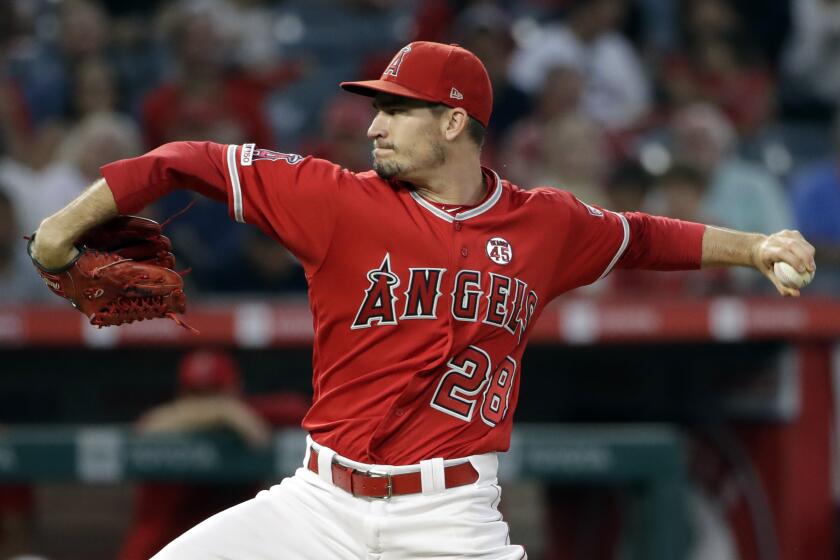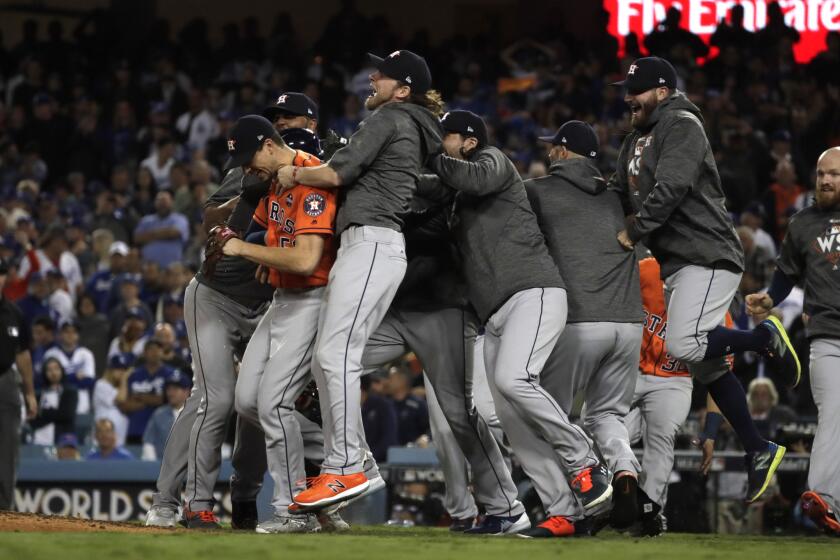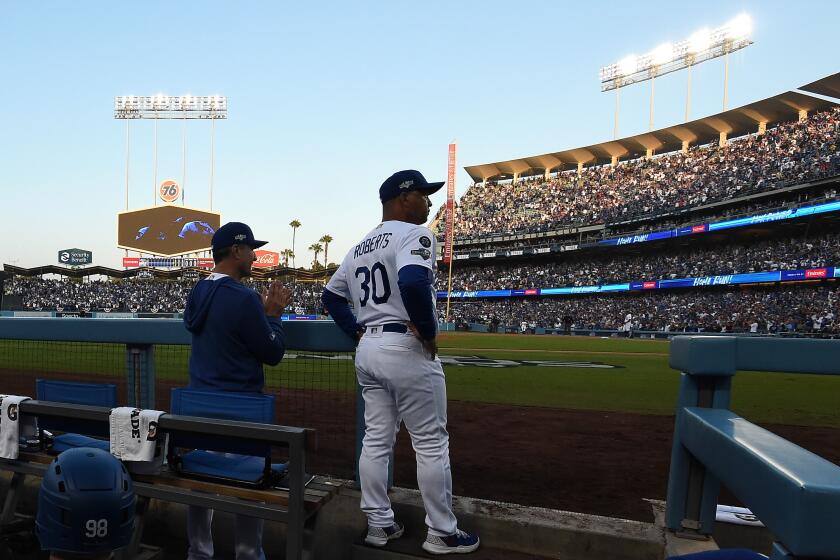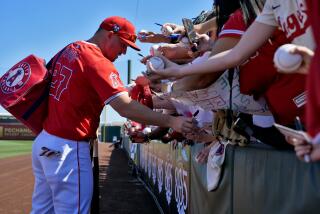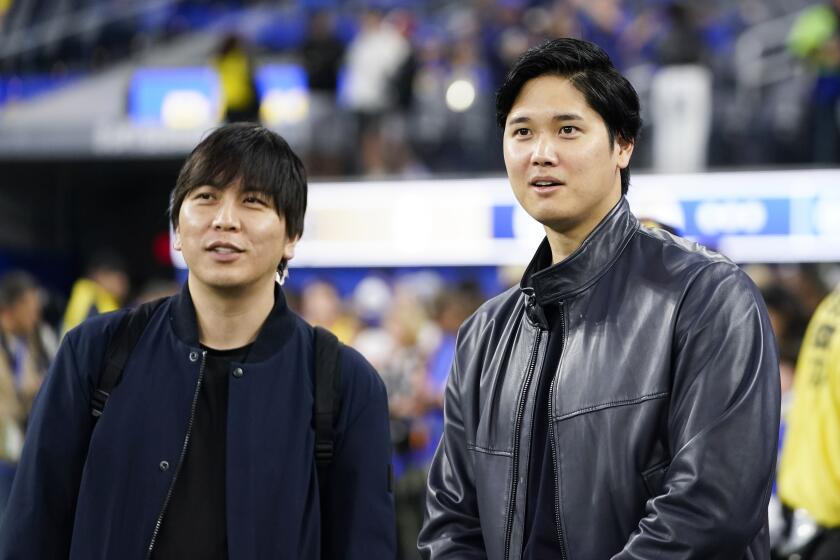One-time phenom pitcher Dylan Bundy gets a fresh start with the Angels
TEMPE, Ariz. — For the first time in nearly 10 years, Dylan Bundy did not migrate from his offseason home in Oklahoma to Florida for spring training. He went farther west, to the Angels camp outside Phoenix, where he expects to rediscover the form that once made him one of baseball’s most heralded prospects.
But rediscovery does not equal reinvention to Bundy. He is comfortable with the player he has become since making his debut with the Baltimore Orioles in 2012 at 19 years old. He is hopeful a change of scenery and a chance to chase a playoff spot will do him some good.
“It’s hard to leave the place you’re brought into and drafted by, and my teammates and familiar faces over there,” Bundy said Thursday. “But it’s a fresh start over here and I’m excited to see what this year holds.”
Bundy’s fresh start has so far included altering his offseason routine. He barely stopped throwing. He chose to activate his arm once or twice week in October and November to get a head start on his spring work.
Angels pitcher Andrew Heaney struggled against the Houston Astros in 2018, and he’s irate not only at the sign stealing but because players haven’t apologized.
There was an instant payoff. New Angels manager Joe Maddon was pleased with Bundy’s first bullpen session.
“He totally knows who he is and what he’s doing,” Maddon said.
Bundy, a first-round draft pick out of Owasso High in Oklahoma, struggled almost immediately. He made only two appearances in 2012, then had Tommy John surgery soon thereafter. A subsequent shoulder injury kept him out of the major leagues until 2016. When he finally claimed his spot at the front of Baltimore’s rotation, his once mid-90s fastball velocity had dipped to 92.4 mph in 2017. It has continued to decline.
He has also never finished a full season with a sub-4.00 ERA. Last year, he had a 4.79 ERA and gave up 29 home runs over 30 starts for a team that finished with 108 losses.
But Maddon is following general manager Billy Eppler’s philosophy and disregarding Bundy’s last four seasons. Both believe environmental factors, such as calling hitter-friendly Camden Yards home and regularly facing high-powered offenses in the American League East, inflated Bundy’s numbers.
“Take that with maybe a [one-run] drop off the number, with his ERA,” said Maddon, who managed the Tampa Bay Rays in the same division from 2006 to 2014. “It’s a different animal there.
“With a guy like him, sometimes it’s just about usage and how he parcels out his pitches that makes the difference. Giving him ideas on how to parcel out his stuff, putting him in a different environment, getting him out of that division in and of itself should make him a better pitcher.”
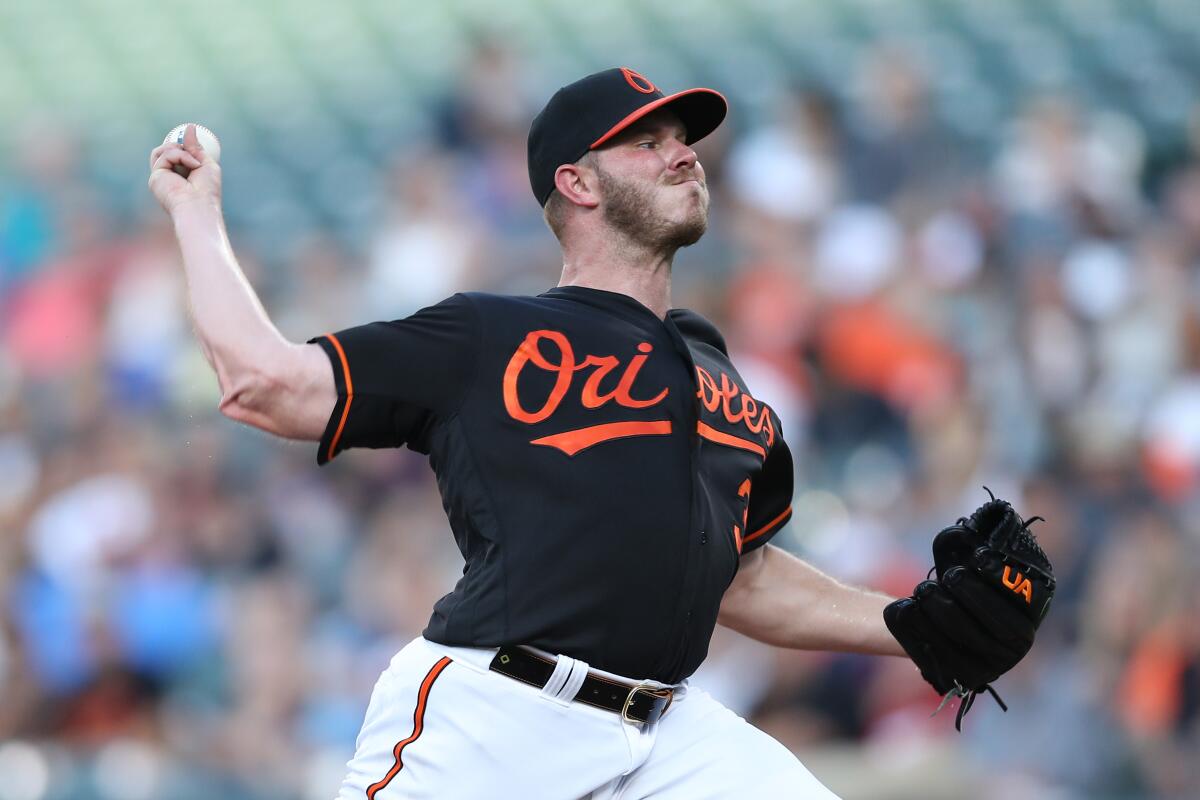
Bundy seemed on a better path last year. He increased his ground-ball rate to nearly 42%, a hike of more than 7 percentage points over the previous year. His fly-ball rate dropped as a result, which was key after coming off a 2018 season in which he gave up an MLB-high 41 home runs.
Bundy has also made up for his declining velocity by better mixing his pitches and going to his low-80s slider. The breaking pitch generated a 47.9% whiff rate and held opponents to a .152 average and .265 slugging percentage in 2019.
“There’s always room for improvement no matter who are,” Bundy said. “It’s just finding out what works for you.”
When the Houston Astros present themselves publicly, they will not do so as AL champions. They will do so as baseball’s greatest villains of this generation.
Anderson out more than a month
After an offseason spent bouncing back from a trapezoid injury that ended his topsy-turvy 2019 season, Angels reliever Justin Anderson came to spring training ready to battle for his second consecutive opening day roster spot. His hopes were dashed this week when he was diagnosed with a grade 2 strain of his left oblique.
Anderson faces a four- to six-week recovery, so there is a significant chance he will begin the season on the injured list.
He sustained the injury while playing catch Tuesday.
“I had two throws left in my throwing program and the next thing I know, someone stabbed me in the side, it felt like,” he said. “I tried to push through it and there was nothing behind it. No torque. No nothing. When it happened, it was a freak thing. It was a pain I never felt before, that’s for sure.”
Anderson’s absence will open the door for someone else to earn a bullpen spot out of camp. Félix Peña, recovering from an August surgery that repaired a torn knee ligament, is expected to be ready by opening day and could be a candidate.
MLB announces rules changes for 2020 season, including three-batter minimum for relief pitchers, active roster limits increasing from 25-26 through Aug. 31.
Messing with rules
MLB’s new rules requiring pitchers to face a minimum of three batters or pitch until the inning is over could be a boon for the Angels’ potent offense. It effectively does away with relief specialists, who were often used for one batter to give their team a favorable matchup.
In the past, teams would disregard the number of outs and bring in a left-hander for the singular purpose of facing the left-handed-hitting Shohei Ohtani. The pitcher would have been replaced as soon as Ohtani’s at-bat ended. Moving forward, teams wanting to match Ohtani against a left-hander will have to risk their specialist facing right-handed hitters, unless Ohtani represents the third out.
Likely to follow Ohtani, who belted 18 homers last year, in the lineup? New Angels slugger Anthony Rendon and power-hitting outfielder Justin Upton.
“All of a sudden you got a really good matchup for you and not for them,” Maddon said.
More to Read
Go beyond the scoreboard
Get the latest on L.A.'s teams in the daily Sports Report newsletter.
You may occasionally receive promotional content from the Los Angeles Times.
